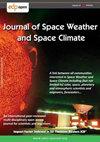Nowcasting Geoelectric Fields in Ireland using Magnetotelluric Transfer Functions.
IF 2.7
2区 物理与天体物理
Q2 ASTRONOMY & ASTROPHYSICS
引用次数: 2
Abstract
Geomagnetically induced currents (GIC) driven by geoelectric fields pose a hazard to ground-based infrastructure, such as power grids and pipelines. Here, a new method is presented for modelling geoelectric fields in near real time, with the aim of providing valuable information to help mitigate the impact of GIC. The method uses magnetic field measurements from the Magnetometer Network of Ireland (MagIE; www.magie.ie), interpolates the geomagnetic field variations between magnetometers using spherical elementary current systems (SECS), and estimates the local electric field using a high density (< 40 km) network of magnetotelluric transfer functions (MT-TF) encompassing the island. The model was optimised to work in near real time, with a correction curve applied to the geoelectric field time series. This approach was successfully validated with measured electric fields at four sites for a number of geomagnetic storms, providing accurate electric fields up to a 1-minute delay from real time, with high coherence (0.70 – 0.85) and signal-to-noise ratio (SNR; 3.2 – 6.5) relative to measured electric field validation time series. This was comparable to a standard non real-time geoelectric field model (coherence = 0.80 – 0.89 and SNR = 4.0 – 7.0). The impact of galvanic distortion on the model was also briefly evaluated, with a galvanic distortion correction leading to a more homogeneous representation of the direction of the electric field, at a regional scale.使用大地电磁传递函数对爱尔兰地电场进行实时预测。
地电场驱动的地磁感应电流对电网和管道等地基基础设施构成威胁。在这里,提出了一种近实时地电场建模的新方法,目的是提供有价值的信息来帮助减轻GIC的影响。该方法使用爱尔兰磁强计网络(MagIE;www.MagIE.ie)的磁场测量,使用球形基本电流系统(SECS)对磁强计之间的地磁场变化进行插值,并使用覆盖该岛的高密度(<40km)大地电磁传递函数网络(MT-TF)估计局部电场。该模型经过优化,可以近乎实时地工作,并将校正曲线应用于地电场时间序列。该方法通过在多个地磁暴的四个地点测量的电场成功验证,提供了比实时延迟1分钟的精确电场,相对于测量的电场验证时间序列具有高相干性(0.70–0.85)和信噪比(SNR;3.2–6.5)。这与标准的非实时地电场模型相当(相干度=0.80–0.89,信噪比=4.0–7.0)。还简要评估了电流失真对模型的影响,通过电流失真校正,可以在区域尺度上更均匀地表示电场的方向。
本文章由计算机程序翻译,如有差异,请以英文原文为准。
求助全文
约1分钟内获得全文
求助全文
来源期刊

Journal of Space Weather and Space Climate
ASTRONOMY & ASTROPHYSICS-GEOCHEMISTRY & GEOPHYSICS
CiteScore
6.90
自引率
6.10%
发文量
40
审稿时长
8 weeks
期刊介绍:
The Journal of Space Weather and Space Climate (SWSC) is an international multi-disciplinary and interdisciplinary peer-reviewed open access journal which publishes papers on all aspects of space weather and space climate from a broad range of scientific and technical fields including solar physics, space plasma physics, aeronomy, planetology, radio science, geophysics, biology, medicine, astronautics, aeronautics, electrical engineering, meteorology, climatology, mathematics, economy, informatics.
 求助内容:
求助内容: 应助结果提醒方式:
应助结果提醒方式:


